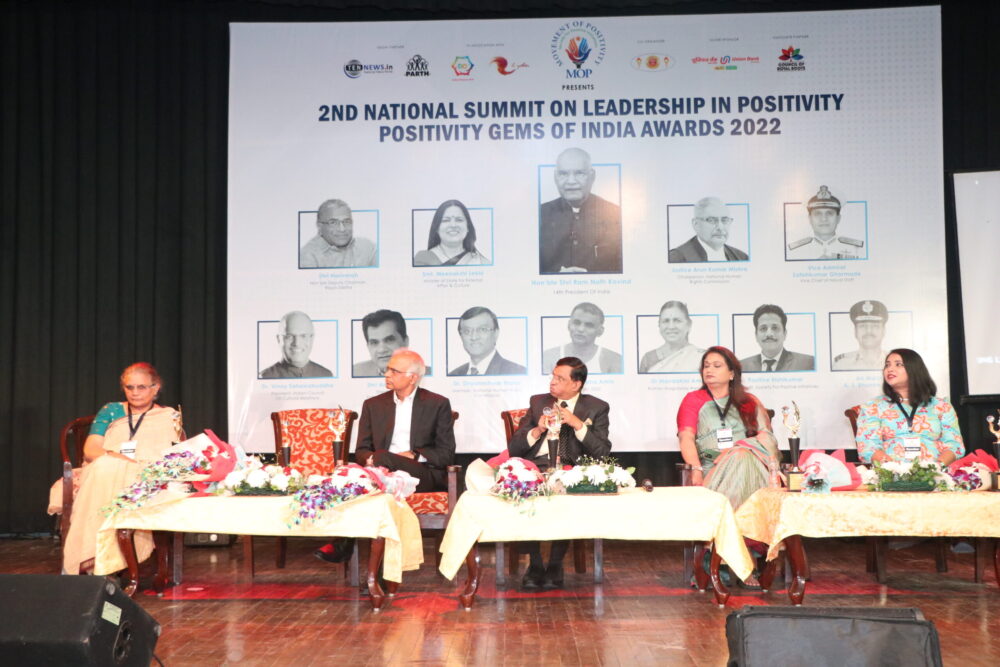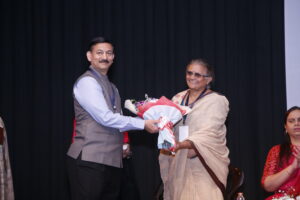Covid-19 overhang to seriously cripple Next Gen leadership, warns Aarohan at Leadership seminar

Key speakers at the 2nd National Summit on Leadership in Positivity & Awards 2022 that was recently organised by Movement of Positivity in New Delhi
Clear warning about the crippling impact of Covid-19 on the quality of the next generation of national leadership was one of the key takeaways of the 2nd National Summit on Leadership in Positivity & Awards 2022, that was recently organised by Movement of Positivity in New Delhi.
While many other speakers painted a rosy picture about the current situation of the country and the ‘rapid strides’ it was taking towards emergence as a global power, Rani Patel, founder President of Aarohan, a Delhi-based NGO that focuses on providing access to education for the underprivileged children and also works with empowerment of transgender community, struck a cautionary note about the prevailing situation in the country, especially vis-à-vis the future generations.
‘‘The prolonged closure of schools during the pandemic has delivered a near-mortal blow to our education system, which even before the pandemic was hardly in a healthy state. An overwhelming proportion of children lacked access to internet and hence their education has taken a severe beating,’’ Patel told the gathering, that included former President Ram Nath Kovind, social activist Prakash Baba Amte, Magsaysay Award winner Mandakini Amte, Deputy Chairman of Rajya Sabha Harivansh, Chairman of the National Human Rights Commission retired Justice Arun Kumar Mishra and Amitabh Kant, G20 Sherpa.
Patel said that not only were the schools closed for over two years, but the government also decided to promote the students to the next class each year, despite clear warnings about poor learning during the closure.
‘‘So, today, you have a child say in Class VII, who was in Class V when the pandemic broke. But the total absence of monitored education has meant that the child has also forgotten the basics learnt in Class V and today finds her learning level to be that of a Class III student, at best. With such a wide gap in the actual level of a child and the class that she has been put into, we are staring a massive disaster in our education in the coming few years,’’ Patel warned the audience.
She warned that with a very poorly-equipped batch of millions of students that the schools all across India will deliver to colleges and universities can only lead to disastrous all-round consequences, including the leadership.
‘‘Over 247 million schools going children in India were affected, out of which more than 3/4th of the students study in government schools, most of them come from marginalised section. This has impacted their learning at a crucial moment in their life and which may hurt them for long. Because, whatever we learn in our first 25 years of age, we use those experiences in addressing the issues and challenges in our lifetime,” Patel said.
‘‘In such a scenario, how can we say that our next generation leadership will be a good one or a positive one when they themselves have had to suffer these unprecedented shocks and for which no remedial measure is being taken,’’ Patel said.
Need to broaden access to human rights
On the issue of providing access to human rights and creating awareness amongst the common people about their rights, Patel appealed to the National Human Rights Commission to create a network of organisations, including State Human Rights Commissions, civil society groups and other stakeholder to broaden awareness about human rights and access to them.
‘‘Such a chain, with the involvement of students will not only
spread awareness and execution of policies, but it will also motivate the students to participate and help them to grow as leaders to attain equality in practice,’’ Patel urged the gathering.
She further added, “In India alone 247 million schools going children were affected, out of which more than 3/4th of the students study in government schools, most of them come from marginalized section.
She believes in “whatever we learn in our first 25 years of age, we use those experiences in addressing the issues and challenges in our lifetime”.










